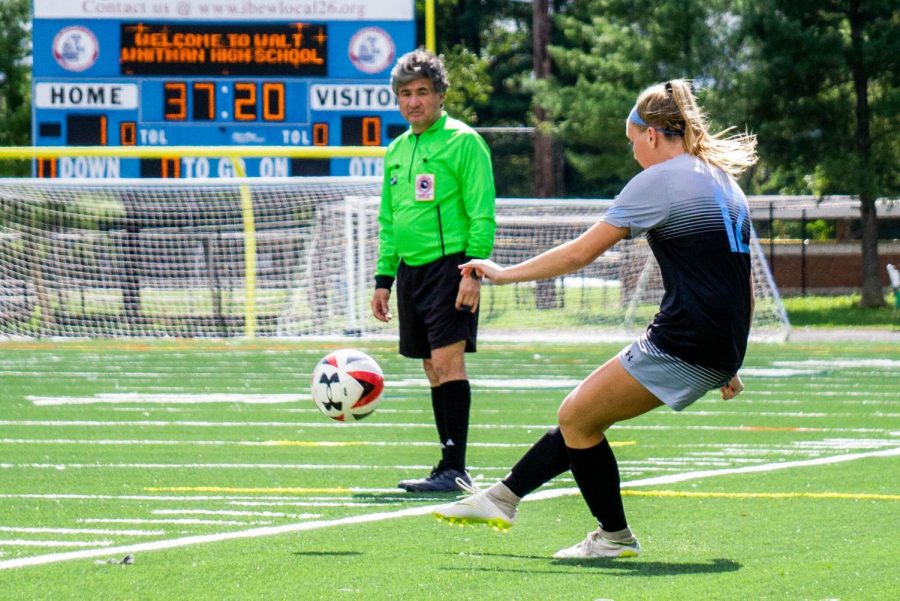Verbal abuse leads to a decrease in high school soccer referees
A soccer referee looks on as a Whitman player passes the ball. Recently, the number of high school soccer referees has decreased as a result of verbal abuse.
October 29, 2018
Maryland soccer referee Dan Heldman watches closely as a player slides studs up into a dangerous challenge, and his opponent crashes to the ground in pain. Heldman blows his whistle and reaches for the red card in his pocket. He raises it above his head and immediately hears screams and profanities coming from parents on the right. The players join in on the noise, surrounding the referee and screaming at him to “take it back.” Heldman isn’t surprised by the response: he’s been through this scenario countless times.
Referee harassment drew national attention this summer following a New York Times article explaining how parent and player abuse of referees has led to drastic referee shortages across the country. While the Metropolitan Washington Soccer Referees Association—the primary referee provider for the sport in the Maryland and Washington D.C. area—doesn’t know if there has been a decline in referees locally, referee harassment remains a major issue: in Heldman’s referee league, 35 percent of new referees quit by the end of first year certification, Heldman said.
“The single most common reason given in follow-up interviews with young referees who have not renewed their registration to become a full referee is the problem of abuse,” Heldman said. “The problem hits hardest those who are smaller than spectators and coaches.”
At high school soccer games, about 85 percent of the matches feature loud vocal dissent from fans, according to a survey of 42 games in Virginia conducted by The Commonwealth Soccer Official Association. Twenty percent of that dissent included profanity. Coaches mostly argue with referees after players receive yellow or red cards, vice president of MWSRA Behnam Farzam said.
This aggressive behavior towards officials occurs at all levels of the sport, even impacting amateur referees.
“I coach games with little kids over the summer and when I blow the whistle, my intention is to make sure the kids are alright,” a junior boy said. “One game I gave a card and called for a penalty kick. Suddenly one coach started screaming at me that I made the wrong decision and everybody was yelling at me.”
The harassment has become so widespread that younger referees usually quit after one season. Only one of five referees return for their third year of officiating, according to the National Federation of State High School Associations.
“From my own observations, referee abuse is very similar to and shares many of the same dynamics as bullying at school,” Heldman said.
Boys soccer coach Dave Greene acknowledges verbal abuse is an issue, but also knows questionable calls can be frustrating for players.
“Some referees like to make the game about themselves,” Greene said. “If you attend a game and when it’s over you don’t even remember the refereeing, then you know they did a great job.”
To combat verbal abuse towards referees, the MWSRA launched the New Referee Development Program in 2016. The program combines previously offered mentorships and training with new discussion groups to better support new referees as they officiate games, MWSRA President Matthew Popkin said.
Legislatures in 20 states, although not in Maryland, have also increased the penalties for assaulting a sports official. Heldman teaches young referees about the State Soccer Association’s proactive program to prevent referee abuse. The program instructs referees to stop play as soon as they feel uncomfortable, approach the coach, spectator or parent and use the ask/tell/dismiss protocol developed by US Soccer.
Referees have the authority to stop the game entirely if spectators continue to yell profanities. Once spectators stop, referees must continue the game.
“[Referees] have to turn away and restart play as though they have every expectation for compliance—no debate, conversation, or response to what may be said behind them,” Heldman said.
Despite new programs designed to tackle this issue, verbal abuse is still a major problem on the field.
“I have been insulted, threatened, even physically attacked by parents, coaches, players and male referees,” an anonymous adult female referee said. “I never felt so discriminated [against] until I started working as a referee.”










